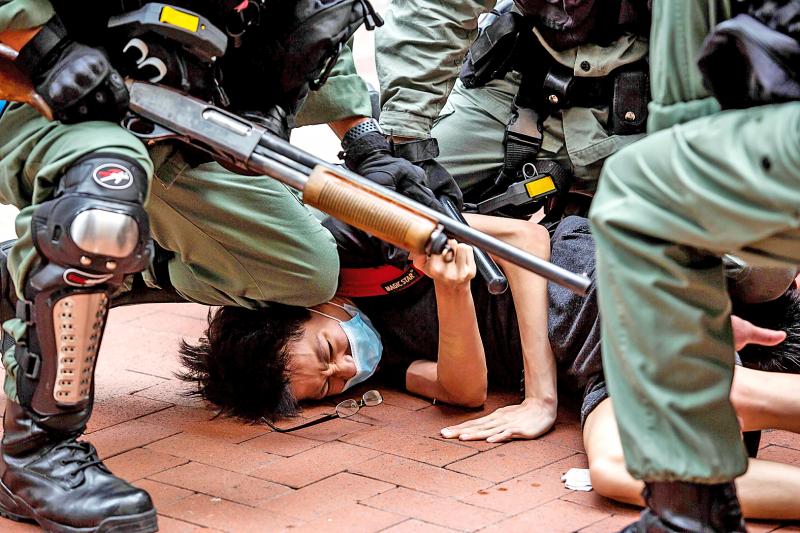The number of people from Hong Kong applying for residency in Taiwan last year rose 41 percent from a year earlier to 5,858, National Immigration Agency statistics showed.
The statistics also showed that 600 applications were filed by Hong Kong residents in the first quarter of this year — three times the number filed in the same period last year — with applicants apparently not deterred by the COVID-19 pandemic.
Just one day after it was reported that the Chinese government plans to enact new national security laws in Hong Kong, inquiries regarding immigration to Taiwan grew 10-fold, a Hong Kong-based immigration consultant was quoted as saying in a Hong Kong media report on Saturday.

Photo: AFP
Separately, a Taiwan-based immigration consultant, speaking on condition of anonymity, said that a series of information sessions they held in Hong Kong in June last year were all filled to capacity.
There was a wave of immigration to Taiwan in 1997 when Hong Kong was handed over to China, followed by a second wave during the 2014 “Umbrella movement,” the Taiwanese consultant said, adding that a third wave occurred last year, around the time of the protests against a proposed extradition bill.
In 2018, there were 4,148 residency applicants and 1,090 permanent residency applicants, agency statistics showed.
Last year, the figures rose to 5,858 and 1,474, respectively.
Of those applying for residency last year, 1,243 people applied in October alone.
Of the reasons given in the residency applications, the top three were “study,” “marriage” and “investment,” in that order.
Sixteen possible ways of applying for residency are stipulated in the Regulations Governing Residency or Permanent Residency for People of the Hong Kong Area and the Macau Area (香港澳門居民進入臺灣地區及居留定居許可辦法). These include applying as a blood relative or spouse of a Taiwanese, as a skilled person holding a Hong Kong Government-issued certificate in a specialized field, as a person of extraordinary accomplishment in a specific field, or as a businessperson investing NT$6 million (US$199,940) or more in Taiwan.
People from other countries immigrating to Taiwan through investment must invest a minimum of NT$30 million, but those from Hong Kong can immigrate with a significantly lower investment, making Taiwan an appealing option, the Taiwanese consultant said.
Those applying as entrepreneurs can come on an even lower investment of only NT$2 million, but they must reside in Taiwan for at least 183 days per year for five years in a row before they are eligible for citizenship, the consultant said.

AGING: As of last month, people aged 65 or older accounted for 20.06 percent of the total population and the number of couples who got married fell by 18,685 from 2024 Taiwan has surpassed South Korea as the country least willing to have children, with an annual crude birthrate of 4.62 per 1,000 people, Ministry of the Interior data showed yesterday. The nation was previously ranked the second-lowest country in terms of total fertility rate, or the average number of children a woman has in her lifetime. However, South Korea’s fertility rate began to recover from 2023, with total fertility rate rising from 0.72 and estimated to reach 0.82 to 0.85 by last year, and the crude birthrate projected at 6.7 per 1,000 people. Japan’s crude birthrate was projected to fall below six,

Conflict with Taiwan could leave China with “massive economic disruption, catastrophic military losses, significant social unrest, and devastating sanctions,” a US think tank said in a report released on Monday. The German Marshall Fund released a report titled If China Attacks Taiwan: The Consequences for China of “Minor Conflict” and “Major War” Scenarios. The report details the “massive” economic, military, social and international costs to China in the event of a minor conflict or major war with Taiwan, estimating that the Chinese People’s Liberation Army (PLA) could sustain losses of more than half of its active-duty ground forces, including 100,000 troops. Understanding Chinese

US President Donald Trump in an interview with the New York Times published on Thursday said that “it’s up to” Chinese President Xi Jinping (習近平) what China does on Taiwan, but that he would be “very unhappy” with a change in the “status quo.” “He [Xi] considers it to be a part of China, and that’s up to him what he’s going to be doing, but I’ve expressed to him that I would be very unhappy if he did that, and I don’t think he’ll do that. I hope he doesn’t do that,” Trump said. Trump made the comments in the context

SELF-DEFENSE: Tokyo has accelerated its spending goal and its defense minister said the nation needs to discuss whether it should develop nuclear-powered submarines China is ramping up objections to what it sees as Japan’s desire to acquire nuclear weapons, despite Tokyo’s longstanding renunciation of such arms, deepening another fissure in the two neighbors’ increasingly tense ties. In what appears to be a concerted effort, China’s foreign and defense ministries issued statements on Thursday condemning alleged remilitarism efforts by Tokyo. The remarks came as two of the country’s top think tanks jointly issued a 29-page report framing actions by “right-wing forces” in Japan as posing a “serious threat” to world peace. While that report did not define “right-wing forces,” the Chinese Ministry of Foreign Affairs was